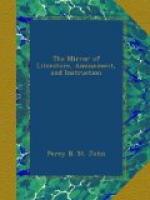Nor are the poets the only eulogists of wine. Some of the greatest names in history are to be found in the list. We find Mr. Burke furnishing reasons why the rich and the great should have their share of wine. He says, they are among the unhappy—they feel personal pain and domestic sorrow—they pay their full contingent to the contributions levied on mortality in these matters;—therefore they require this sovereign balm. “Some charitable dole,” says he, “is wanting to those, our often very unhappy brethren, to fill the gloomy void that reigns in minds which have nothing on earth to hope or fear; something to relieve the killing languor and over-laboured lassitude of those who have nothing to do.”
This observation of Mr. Burke’s introduces it to our notice as a remedy—as a medicine, in the hands of a physician. Thus we find particular wines recommended by particular doctors, having a fashionable run as specifics:—at one time all the gouty people were drinking Madeira; and many a man persuaded himself he had a fit of flying gout, for the sake of the remedy.[7] Somebody, however, found out that Madeira contained acid, and straight the cellars were rummaged for old Sherry. This change was attributed to Dr. Baillie, who had no more to do with it than Boerhaave, as he has been known to declare. Sherry, and nothing but Sherry, however, could or would the Podagres drink.
Dr. Reynolds, who lived and practised very much with the higher orders, had a predilection for that noble and expensive comforter, Hoc! which short word, from his lips, has often made the doctor’s physic as costly as the doctor’s fee.
Wine has also been recommended, by the highest medical authorities, as alleviating the infirmities of old age.
A Greek physician recommended it to Alexander as the pure blood of the earth.
Though an excess in wine is highly blamable, yet it is more pardonable than most other excesses. The progressive steps to it are cheerful, animating, and seducing; the melancholy are relieved, the grave enlivened, the witty and gay inspired—which is the very reverse of excess in eating: for, Nature satisfied, every additional morsel carries dulness and stupidity with it. “Every inordinate cup is unbless’d, and the ingredient is a devil,” says Shakspeare.
“King Edgar, like a king of good fellows,” adds Selden, “or master of the revels, made a law for Drinking. He gave orders that studs, or knobs of silver or gold (so Malmesbury tells us.) should be fastened to the sides of their cups, or drinking vessels, that when every one knew his mark or boundary, he should, out of modesty, not either himself covet, or force another to desire, more than his stint.” This is the only law, before the first parliament under king James, that has been made against those swill-bowls,
Swabbers of drunken feasts, and lusty
rowers,
In full-brimmed rummers that do ply their
oars,




